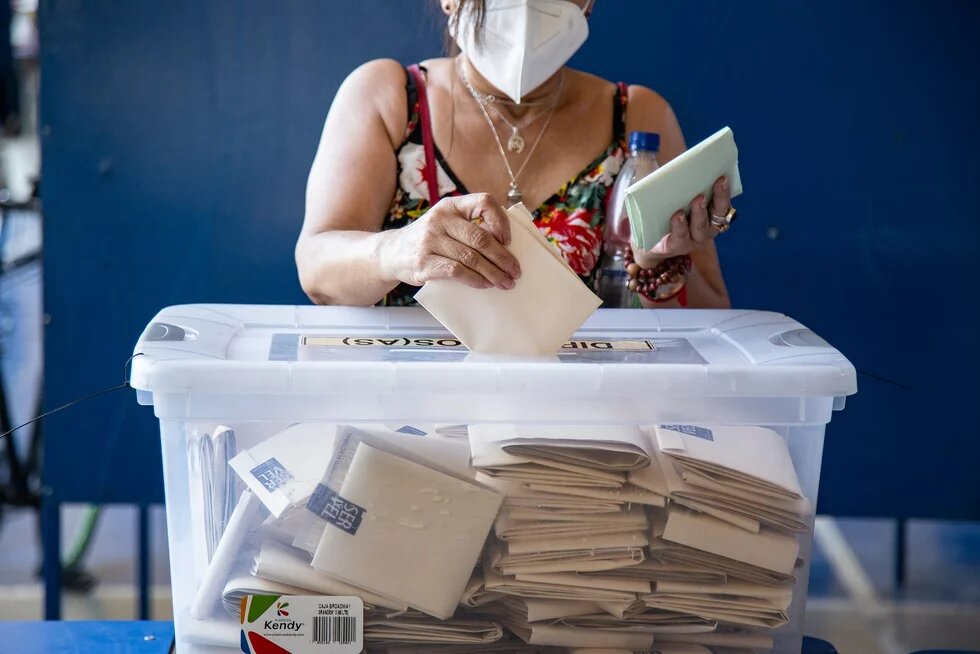In the second round of the presidential elections on 19 December 2021, Chile will be deciding between the far-right candidate, José Antonio Kast, and the left-wing progressive Gabriel Boric. Non-voters and anti-politicians may be able to tip the balance in these pivotal elections. Interview with Gitte Cullmann, office director of the Heinrich-Böll-Stiftung in Santiago de Chile.

Caroline Kassin: In the constitutional referendum last year, 78% of those who voted did so in favour of a new constitution; it was predominantly left-wing, progressive candidates who were voted onto the constitutional convention. Now, a right-wing extremist in the person of José Antonio Kast has won the first round of the elections. How does that fit together?
Gitte Cullmann: The constitutional convention has been at work for six months to build the demands people protested for, such as a fairer education and pension system, into a new constitution. But obviously, its successes are not yet visible. At the same time, the presidential elections came at a time in which the pandemic has already left its mark, people have been hit hard by unemployment and increasing poverty. This uncertainty has created a kind of vacuum that has now been filled by the far-right candidate José Antonio Kast with his rhetoric of fear.
With this, he appears to have fallen onto very fertile soil. He won the first round with 27.91%, two percentage points clear ahead of Boric (25.83%).
There are indeed sections of the population who are worried about the future, about change, growing crime figures, migration. There is also uncertainty caused by the ongoing protests and acts of repression, which have in some cases been deliberately escalated into violence by the security forces. The rhetoric of the iron hand has instrumentalised this uncertainty, which has catapulted Kast to enormous success very quickly. The traditional parties of the post-Pinochet era, wherever they are on the political spectrum, were unable to come up with any answers to this situation. In any case, the public long ago denied them the ability to represent themselves as a government of a fundamentally shifting society. Fast-forward to today and we see a highly polarised election race between the ultra-right-wing José Antonio Kast and the pro-democratic, left-wing progressive Gabriel Boric.
After the Constitutional Convention elections, many people hoped for political change at a very fundamental level and a left-wing majority in Chilean society. Was this a miscalculation?
That can only be analysed in a longer-term perspective. The constitutional process has been underway for some time already and is therefore relatively independent of the recent intense presidential election campaign. The rhetoric in the election campaign also related more to matters of short-term everyday policy – the economy, work, crime – rather than the underlying questions of long-term transformation. The constitutional process is ongoing, but has not had a media focus and, more importantly, did not have the same presence as the escalating election rhetoric of the far-right candidate. However, the short-term, day-to-day political statements and positions in the election campaign obviously also imply ideas and visions about the future constitution of society and the country – which means if Kast wins, we will have to look very closely at what will happen with the constitutional process.
In the first elections, turnout was just 47%. During the protests of 2019, we heard the words “Chile Despertó” (Chile has awoken) a lot – did the mass protests and subsequent constitutional process not lead to an end of political disenchantment?
Since compulsory voting was abolished in 2012, turnout in Chile has constantly been below 50%. Even in the referendum and its encouraging result of 78% in favour of a new constitution, turnout was just 50.9%. The complexity of the legal process of a new constitution, together with the current crisis flashpoints, in other words the pandemic, the militarisation of the conflict in southern Chile, but also poverty, were never going to increase confidence in politics. Around half of the population continues to have no faith in the political system, political leadership and the political parties.
Even so, is a higher turnout in the second round likely?
It’s possible – precisely because the situation is so tense and the country is basically being asked to choose its future direction. But it is often really trivial things that influence voter turnout. The weather was a huge factor in the first round, as people had to queue outside for up to four hours in 30° heat. That was shown live on TV during the elections and it put a lot of people off going to vote.
How are the two candidates hoping to get non-voters mobilised to turn out for the second round?
Gabriel Boric has acknowledged that his previous election campaign and therefore his voters are concentrated mainly in the metropolitan region, particularly in Santiago and Valparaiso. He is pursuing the right strategy of getting the regions more on board. At the moment, he is travelling round the whole country to gain the trust of the rural population as well and send out messages for the much-needed decentralisation of the country. José Antonio Kast, on the other hand, is watering down his previously ultra-right-wing election manifesto to appeal to more moderate right-wing voters and supporters of the third-placed anti-politician candidate Parisi.
Is Boric also addressing the subjects of security and the fight against crime in an attempt to win support from outside his core voters?
Yes, absolutely. After the first round, he moved away from the role of student leader and now is including the issues that are of the greatest concern to the people – crime, security, drugs trafficking – in his manifesto.
In parts of the German press, Boric is depicted as a “radical left-wing” counter-candidate to Kast…
These elections are actually more about a decision between democratic, progressive left-wing and authoritarian, ultra-right-wing. Boric is definitely not ultra-left-wing, but obviously, left-wingers are now getting behind him, because democracy itself is at stake and they will all support him in that role.
There is a lot of talk about polarisation – what is the mood like as we move towards the run-off?
The mood is pretty tense, very nervy – a rhetoric somewhere between hope and fear. 19 December 2021 will see nothing less than the most important election in this form that democratic Chile has ever seen: they are choosing between a pro-democratic, progressive government that takes matters such as climate change, social justice and the future viability of the country seriously, and the ultra-right-wing candidate in the new global tradition of the new Right, borrowing from the rhetoric and mechanisms of Bolsonaro, Trump et al, with his radical, seriously dangerous ideas, such as abolishing women’s right to vote, leaving the United Nations and doing away with the National Institute of Human Rights. Kast is not simply calling the successes of the democratic transformation movement into question, he is denying that they ever existed. These elections are therefore about either supporting the process under way, or – as Kast already announced – blocking it.
What (or who) is going to tip the balance in the run-off elections of 19 December 2021?
It is going to depend largely on what the supporters of the third-placed Franco Parisi (12.81%) decide to do. He mounted his election campaign online from the USA, never set foot on Chilean soil at any point – because there is an arrest warrant out for him over unpaid alimony for his children. The bulk of his voters are young people who reject the political system. As an anti-politician, he operates an anti-rhetoric against the political establishment and examines economic issues a lot. here is, of course, a presumption that Kast will address these issues more than Boric, but I think it will really depend on how the two candidates approach these potential voters.
Have the other unsuccessful candidates taken position and appealed to their voters to back one or the other of the remaining candidates in the run-offs?
The fourth-placed Sebastian Sichel (12.97%) from the centre-right party UDI has come out in favour of Kast, but tied it to a nine-point-plan of democratic conditions – very few of which Kast has so far accepted. Boric has the support of Yasna Provoste (11.61%) of the Christian Democratic Party and Marco Enriques-Ominami (7.61%) of the Progressive Party. Despite these declarations of support, it is still anyone’s race. The last surveys put Boric 5 points ahead of Kast, but the last few days before the election will be critical – even the slightest mistake could tip the balance the other way.


